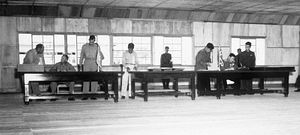Since South Korean President Moon Jae-in proposed a formal declaration of the end of the Korean War in his address at the United Nations in September, Seoul has reactivated Moon’s “peace process.” The ultimate goal is to persuade North Korea to sit down with U.S. counterparts to make progress on the denuclearization of the Korean Peninsula before Moon’s term ends in May 2022.
U.S. officials have also held meetings with South Korean counterparts to discuss a draft declaration in the last two months, but the two countries had different opinions on the timing and sequence of the bilateral talks over an end-of-war declaration.
However, South Korean senior diplomats have explicitly expressed optimistic views on bilateral talks with the United States over the issue.
Choi Jong-kun, Seoul’s first vice foreign minister, told reporters at Washington’s Dulles International Airport on Sunday that he expects a “good result” over the end-of-war declaration soon. Choi also said that South Korea and the U.S. have no disagreements on the timing for formally ending the Korean War, making efforts to show North Korea and the international community that the two countries are working in lockstep to tackle the North Korea issue.
Choi is going to meet his U.S. and Japanese counterparts during his visit to Washington, D.C.
In addition, Seoul’s Foreign Minister Chung Eui-yong said last week at the National Assembly that “the coordination between South Korea and the U.S. is in the final stage” and “the format and content of the end-of-war declaration” have almost been settled. Although Chung implied that the two countries had made progress in making a draft, he also acknowledged that “it would take time” to declare the end of the Korean War officially.
Washington has indirectly shown its concern and pessimistic view over the Moon government’s rush to end the Korean War in order to entice North Korean leader Kim Jong Un back to the negotiating table.
National Security Advisor Jake Sullivan said in September that the Biden administration may have “different perspectives on the precise sequence or timing or conditions for different steps” in response to a question on the end-of-war declaration. Since then, Washington has been mostly silent on the results of bilateral talks with South Korea over the declaration to end the Korean War officially in the last two months.
Washington has quietly supported Moon’s final attempt to entice North Korea to re-engage diplomacy with South Korea and the U.S. However, as some in Washington predict that an end-of-war declaration would negatively impact the state of the South Korea-U.S. alliance and United Nations Command, the Biden administration has not embraced the idea along with the Moon administration, even while Washington continues to make statements about creating room for dialogue with Pyongyang.
“Washington does not seem to at all think a front-end declaration of the end of the Korean War is a good idea in the context of negotiations with the North,” Mason Richey, a professor of international and area studies at Hankuk University of Foreign Studies in Seoul, told The Diplomat. “Washington sees such a declaration as an output of diplomacy, not an enticement for the North to come to the negotiation table.”
As U.S. officials have frequently come to South Korea to discuss regional issues with South Korean counterparts recently, however, the Moon administration hopes to reach a productive outcome as a first step toward the denuclearization on the Korean Peninsula.
“The Moon administration is drumming up international support for an end-of-war declaration to show diplomatic effort to Pyongyang,” Leif-Eric Easley, associate professor of international studies at Ewha Womans University in Seoul, told The Diplomat.
Seoul has actively engaged in talks with the U.S. to devise the outline for the declaration to end the Korean War, but it has not successfully drawn the attention of North Korea.
Kim Yo Jong, the powerful sister of the North’s leader and main mouthpiece on the inter-Korean relations, published a statement to partially welcome Moon’s proposal in September. Since the arms race kicked off on the Korean Peninsula, Kim has consistently demanded that Seoul and Washington remove the “hostile policy,” which in practice would mean the withdrawal of the U.S. troops in South Korea and a permanent halt to joint South Korea-U.S. military drills.
North Korea has made clear that it will not renew dialogue with the U.S. and South Korea unless the United States makes concessions and meet its preconditions first. Given that context, reaching agreement on a draft end-of-war declaration between the U.S. and South Korea is just one step in a larger journey. The next hurdle would be negotiating with North Korea and China.
“[The] Kim regime prioritizes sanctions relief over reconciliation with South Korea [and] recent North Korean reactions to Seoul’s proposals range from unresponsiveness to spite,” Easley said. He pointed to the unrealistic demands both Kim Yo Jong and Pyongyang’s U.N. ambassador, Kim Song, have made: curtailing U.S.-South Korea defense cooperation and dismantlement of the United Nations Command that enforces the Korean War armistice.
The Korean War ended in an armistice in 1953, but there was no South Korean representative in the ceasefire negotiations. As the Korean War did not end in a peace treaty, South Korea is now eager to end the Korean War to set a long-term plan for inter-Korean cooperation and permanent denuclearization on the Korean Peninsula.

































